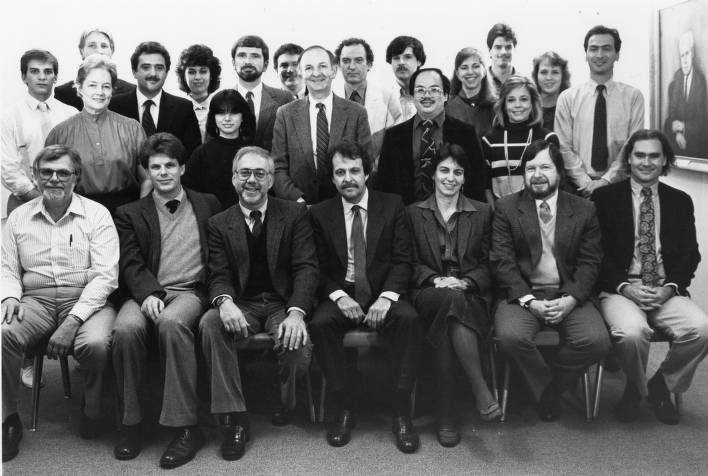Profile

Louise Kidder
Birth:
1942
Training Location(s):
PhD, Northwestern University
BA, Oberlin College
Primary Affiliation(s):
Professor, Department of Psychology & Women's Studies, Temple University (–2006)
Division 9: Society for the Psychological Study of Social Issues (SPSSI), American Psychological Association (1967–)
Psychology’s Feminist Voices Oral History Interview:
Other Media:
Career Focus:
Acculturation issues; qualitative methods; experimental social psychology; feminism; sex roles; phenomenology
Biography
Dr. Louise Kidder’s career has been marked by a wide range of experiences across the United States and around the world. Born into an academic family in New York, she seemed destined for a life in scholarship. Her father, who held a PhD in clinical psychology, was her first introduction to the field. Reflecting on his influence, she later recalled, “He loved what he did, and he got his degree in clinical psychology from Teachers College. And when I went to college, I knew from the first day that I wanted to study psychology.” This early exposure sparked a lifelong interest and career in the discipline.
Her studies began at Oberlin College, where she trained in what she described as “a very good psych department.” In her final year, she was granted the opportunity to design and direct her own research study. Initially, however, she was put off by psychology’s rigid methods and the way participants were treated. During her first study on stabilized retinal images, she recalled feeling uneasy: “I used to feel really uncomfortable as I was taking the ‘subjects’ up to this darkened laboratory room… because I was taking this interesting person into a laboratory and then narrowing the focus down to practically nothing.” This discomfort led her to explore phenomenology, which allowed her to engage more deeply with participants’ experiences and with the meanings that emerged from them.
After completing her undergraduate studies, Dr. Kidder made the bold decision to move to India. Through an Oberlin exchange program, she taught English and immersed herself in Indian culture and the Hindi language. Initially, she intended to study the construction of reality between patients and doctors, but after spending more time with foreign visitors to India, her research interests shifted. She became increasingly concerned with neo-colonialism, focusing on the behavior of Westerners in less privileged countries. This transformative experience broadened her social and cultural perspective and shaped her later work.
Upon returning to the United States, she pursued graduate studies at Northwestern University, where she received advanced training in social psychology and phenomenology. It was also during this period that she became deeply involved in the feminist movement. She participated in consciousness-raising groups and learned to prioritize her professional ambitions while balancing motherhood. Together with fellow scholars such as Jeanne Marecek, she formed a feminist reading group, and with the support of Marilyn Brewer, who served on her PhD committee, she developed a strong network of feminist mentors. She completed her doctorate at Northwestern under the supervision of Dr. Phil Brickman.
Following her PhD, Dr. Kidder began a postdoctoral fellowship with the National Institutes of Health. She then moved to Philadelphia, where she joined the faculty at Temple University, a position she would hold for the next four decades. During her tenure, she made another significant move, this time to Japan, to work at Temple University’s Japanese campus. There, she became a member of International Feminists of Japan and served as a consultant at the Tokyo Rape Crisis Centre, gaining invaluable insights into cultural differences surrounding gender and sexual violence.
Dr. Kidder has been an active member of the American Psychological Association throughout her career, particularly in Division 35 (the Society for the Psychology of Women) and Division 9 (the Society for the Psychological Study of Social Issues, or SPSSI). Her involvement with SPSSI has been especially impactful. As a graduate student, she contributed to the revision of a foundational methodology book, and she later served as a council member for seven years. In recognition of her early career achievements and service, SPSSI established the Louise Kidder Early Career Award, presented annually to scholars who have made significant early contributions to the study of social issues.
Academically, Dr. Kidder’s work spans a wide range of topics, reflecting both her international experiences and her personal and political commitments. She was among the early voices advocating for the importance and legitimacy of qualitative methods in psychology. Her publications include studies on her experiences in India, analyses of foreigners’ roles in cross-cultural contexts, and examinations of the status of women in Japan. She also collaborated with leading feminist scholars, including Michelle Fine, to produce A Bibliography of Feminist Visions, which she described as a piece of “social science fiction.” Her extensive body of work reflects what she once called her “love of the act of putting words together and creating images.”
Dr. Kidder retired from Temple University in 2006 and now lives in Massachusetts, where she enjoys organic gardening and yoga. Yet her influence continues: her scholarship remains widely cited, and her commitment to justice continues to inspire. Reflecting on the central thread of her work, she has described it as a pursuit of “social justice, equity, and equality,” values rooted in her family’s own history of overcoming barriers, where her grandparents immigrated from Germany as children and were denied access to education. Across four decades, her research, teaching, and activism have remained steadfast in addressing injustice—both within the field of psychology and in the wider world.
by Aaron Peniston (2025)
To cite this article, see Credits
Selected Works
Fine, M., Kidder, L., & Boell, J. (1985). Imaging Feminist Visions: Comments on a bibliography. Imagination Cognition and Personality, 5(1), 73–82. https://doi.org/10.2190/fkcc-x65c-ycjf-r2wx
Judd, C. M., Smith, E. R., & Kidder, L. H. (1991). Research methods in social relations. Harcourt Brace College Publishers.
Kidder, L. H. (1992). Requirements for being “Japanese”: Stories of returnees. International Journal of Intercultural Relations, 16(4), 383–393. https://doi.org/10.1016/0147-1767(92)90029-T
Kidder, L. H., & Fine, M. (1987). Qualitative and quantitative methods: When stories converge. New Directions for Program Evaluation, 1987(35), 57–75. https://doi.org/10.1002/ev.1459
Kidder, L. H., Lafleur, R. A. and Wells, C. V. (1995), Recalling Harassment, Reconstructing Experience. Journal of Social Issues, 51, 53-67. https://doi.org/10.1111/j.1540-4560.1995.tb01308.x
Kidder, L. H., & Stewart, M. (1975). The psychology of intergroup relations : conflict and consciousness. McGraw-Hill.
Marecek, J., Fine, M., & Kidder, L. (2001). Working between two worlds: Qualitative methods and psychology. In D. L. Tolman & M. Brydon-Miller (Eds.), From subjects to subjectivities: A handbook of interpretive and participatory methods (pp. 29–41). New York University Press.
Photo Gallery



Louise Kidder
Birth:
1942
Training Location(s):
PhD, Northwestern University
BA, Oberlin College
Primary Affiliation(s):
Professor, Department of Psychology & Women's Studies, Temple University (–2006)
Division 9: Society for the Psychological Study of Social Issues (SPSSI), American Psychological Association (1967–)
Psychology’s Feminist Voices Oral History Interview:
Other Media:
Career Focus:
Acculturation issues; qualitative methods; experimental social psychology; feminism; sex roles; phenomenology
Biography
Dr. Louise Kidder’s career has been marked by a wide range of experiences across the United States and around the world. Born into an academic family in New York, she seemed destined for a life in scholarship. Her father, who held a PhD in clinical psychology, was her first introduction to the field. Reflecting on his influence, she later recalled, “He loved what he did, and he got his degree in clinical psychology from Teachers College. And when I went to college, I knew from the first day that I wanted to study psychology.” This early exposure sparked a lifelong interest and career in the discipline.
Her studies began at Oberlin College, where she trained in what she described as “a very good psych department.” In her final year, she was granted the opportunity to design and direct her own research study. Initially, however, she was put off by psychology’s rigid methods and the way participants were treated. During her first study on stabilized retinal images, she recalled feeling uneasy: “I used to feel really uncomfortable as I was taking the ‘subjects’ up to this darkened laboratory room… because I was taking this interesting person into a laboratory and then narrowing the focus down to practically nothing.” This discomfort led her to explore phenomenology, which allowed her to engage more deeply with participants’ experiences and with the meanings that emerged from them.
After completing her undergraduate studies, Dr. Kidder made the bold decision to move to India. Through an Oberlin exchange program, she taught English and immersed herself in Indian culture and the Hindi language. Initially, she intended to study the construction of reality between patients and doctors, but after spending more time with foreign visitors to India, her research interests shifted. She became increasingly concerned with neo-colonialism, focusing on the behavior of Westerners in less privileged countries. This transformative experience broadened her social and cultural perspective and shaped her later work.
Upon returning to the United States, she pursued graduate studies at Northwestern University, where she received advanced training in social psychology and phenomenology. It was also during this period that she became deeply involved in the feminist movement. She participated in consciousness-raising groups and learned to prioritize her professional ambitions while balancing motherhood. Together with fellow scholars such as Jeanne Marecek, she formed a feminist reading group, and with the support of Marilyn Brewer, who served on her PhD committee, she developed a strong network of feminist mentors. She completed her doctorate at Northwestern under the supervision of Dr. Phil Brickman.
Following her PhD, Dr. Kidder began a postdoctoral fellowship with the National Institutes of Health. She then moved to Philadelphia, where she joined the faculty at Temple University, a position she would hold for the next four decades. During her tenure, she made another significant move, this time to Japan, to work at Temple University’s Japanese campus. There, she became a member of International Feminists of Japan and served as a consultant at the Tokyo Rape Crisis Centre, gaining invaluable insights into cultural differences surrounding gender and sexual violence.
Dr. Kidder has been an active member of the American Psychological Association throughout her career, particularly in Division 35 (the Society for the Psychology of Women) and Division 9 (the Society for the Psychological Study of Social Issues, or SPSSI). Her involvement with SPSSI has been especially impactful. As a graduate student, she contributed to the revision of a foundational methodology book, and she later served as a council member for seven years. In recognition of her early career achievements and service, SPSSI established the Louise Kidder Early Career Award, presented annually to scholars who have made significant early contributions to the study of social issues.
Academically, Dr. Kidder’s work spans a wide range of topics, reflecting both her international experiences and her personal and political commitments. She was among the early voices advocating for the importance and legitimacy of qualitative methods in psychology. Her publications include studies on her experiences in India, analyses of foreigners’ roles in cross-cultural contexts, and examinations of the status of women in Japan. She also collaborated with leading feminist scholars, including Michelle Fine, to produce A Bibliography of Feminist Visions, which she described as a piece of “social science fiction.” Her extensive body of work reflects what she once called her “love of the act of putting words together and creating images.”
Dr. Kidder retired from Temple University in 2006 and now lives in Massachusetts, where she enjoys organic gardening and yoga. Yet her influence continues: her scholarship remains widely cited, and her commitment to justice continues to inspire. Reflecting on the central thread of her work, she has described it as a pursuit of “social justice, equity, and equality,” values rooted in her family’s own history of overcoming barriers, where her grandparents immigrated from Germany as children and were denied access to education. Across four decades, her research, teaching, and activism have remained steadfast in addressing injustice—both within the field of psychology and in the wider world.
by Aaron Peniston (2025)
To cite this article, see Credits
Selected Works
Fine, M., Kidder, L., & Boell, J. (1985). Imaging Feminist Visions: Comments on a bibliography. Imagination Cognition and Personality, 5(1), 73–82. https://doi.org/10.2190/fkcc-x65c-ycjf-r2wx
Judd, C. M., Smith, E. R., & Kidder, L. H. (1991). Research methods in social relations. Harcourt Brace College Publishers.
Kidder, L. H. (1992). Requirements for being “Japanese”: Stories of returnees. International Journal of Intercultural Relations, 16(4), 383–393. https://doi.org/10.1016/0147-1767(92)90029-T
Kidder, L. H., & Fine, M. (1987). Qualitative and quantitative methods: When stories converge. New Directions for Program Evaluation, 1987(35), 57–75. https://doi.org/10.1002/ev.1459
Kidder, L. H., Lafleur, R. A. and Wells, C. V. (1995), Recalling Harassment, Reconstructing Experience. Journal of Social Issues, 51, 53-67. https://doi.org/10.1111/j.1540-4560.1995.tb01308.x
Kidder, L. H., & Stewart, M. (1975). The psychology of intergroup relations : conflict and consciousness. McGraw-Hill.
Marecek, J., Fine, M., & Kidder, L. (2001). Working between two worlds: Qualitative methods and psychology. In D. L. Tolman & M. Brydon-Miller (Eds.), From subjects to subjectivities: A handbook of interpretive and participatory methods (pp. 29–41). New York University Press.


